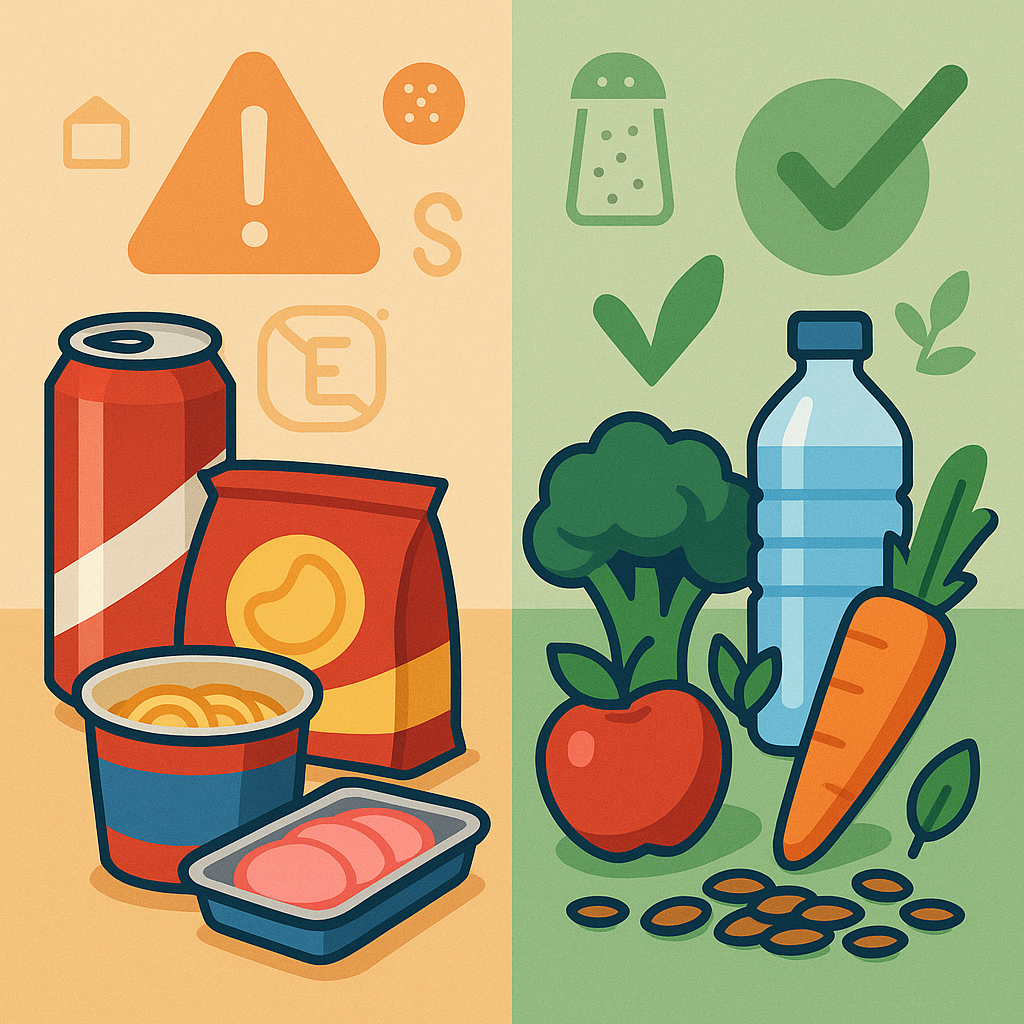In today’s fast-paced world, processed foods have become a major part of modern diets. They are convenient, affordable, and widely available—but beneath the packaging lies a serious threat to human health. While not all processing is harmful, highly processed and ultra-processed foods are strongly linked to chronic diseases, poor nutrition, and long-term health risks.
In this article, we will explore the dangers of processed foods, the science behind their impact on the body, and practical steps you can take to reduce your dependence on them.

What Are Processed Foods?
Processed foods are any foods that have been altered from their natural state through methods such as freezing, canning, baking, or adding preservatives.
- Minimally processed foods: Frozen vegetables, packaged salads, or pre-cut fruits.
- Processed foods: Canned beans, cheese, or whole-grain bread.
- Ultra-processed foods: Sugary cereals, instant noodles, sodas, packaged snacks, fast food.
It’s the ultra-processed category that poses the greatest health risks.
The Hidden Dangers of Processed Foods
1. High Levels of Added Sugar
One of the biggest concerns with processed foods is their excess sugar content. Sugary snacks, sodas, and breakfast cereals often contain hidden sugars that:
- Increase the risk of obesity
- Spike blood sugar levels, leading to type 2 diabetes
- Contribute to fatty liver disease
- Accelerate tooth decay
According to health experts, many processed products contain far more sugar than the recommended daily limit.
2. Excessive Salt (Sodium)
Salt is widely used in processed foods for flavor and preservation. However, high sodium intake is directly linked to:
- High blood pressure
- Stroke and heart disease
- Kidney damage
Packaged soups, frozen meals, chips, and fast food are major sources of hidden salt.
3. Unhealthy Fats
Processed foods often contain trans fats and refined oils, which can:
- Raise bad cholesterol (LDL)
- Lower good cholesterol (HDL)
- Increase the risk of heart disease
- Trigger inflammation in the body
Common culprits include fried snacks, margarine, and baked goods like cookies and pastries.
4. Chemical Additives and Preservatives
To extend shelf life and enhance flavor, processed foods are filled with:
- Artificial colors and flavors
- Preservatives (like nitrates in processed meats)
- Flavor enhancers (MSG)
These chemicals may cause allergies, digestive issues, and in some studies, have been linked to cancer.
- Low Nutritional Value
Ultra-processed foods are often called “empty calories”, because they:
Do not provide vitamins, minerals, or fiber
Are full of calories without nutrients
Will create nutrient deficiencies over time.
A diet that is mostly ultra-processed foods can lead to fatigue, poor immunity, and bad skin.
- Higher risk of obesity and chronic diseases
There are numerous studies linking consumption of processed food to:
Obesity
Type 2 diabetes
Cardiovascular diseases
Certain cancers
Ultra-processed foods are addictive by design so it is easy to eat too much and have little satiety.
- Mental Health
Emerging research shows that processed foods may negatively impact mental health:
Diets high in sugar may lead to depression and anxiety
Gut health from heavily processed foods may negatively affect brain function
Consumption of junk foods may decrease focus and memory
Nutrition is not just about the body – it also involves the mind.
How to recognize processed food
To lessen the threat to your health, it is important to begin recognizing processed foods by looking for:
Long ingredient lists of chemical-like ingredients that cannot be recognized.
High sugar (or sodium) in the nutrition label.
Words like “refined”, “instant”, and “artificial”
Anything from pre-packaged snacks to ready meals and sweetened beverages.
How to avoid processed foods
- Make more meals from home
By preparing your meals from scratch, you have full control of the ingredients you are using and you can make sure there are no hidden sugars, salts, or unhealthy fats.

- Use whole food products
Try to find food in its’ natural form:
- Fresh fruit and vegetables
- Whole grains (brown rice, oats, quinoa)
- Lean meats and fish
- Nuts, seeds, and legumes
- Shop the perimeter of the grocery store
Usually, fresh produce, dairy, and meats are found in the outer aisles of the store, while processed items will fill up the center shelves.
- Read the food labels
When reading labels, look for:
- Fewer ingredients
- No added sugars and no artificial preservatives
- Options with the least amount of sodium
- Substitute sugary drinks with water
Soda, energy drinks and bottled juices are some of the worst offenders. Instead drink:
- Water
- Herbal tea
- Infused water with lemon or cucumber
- Meal prepare for those busy days
If you plan and prepare meals for those busy days, you are less likely to grab fast food or packaged snacks.
- Moderation

It may be unrealistic to cut out processed foods altogether. Instead try by:
- Limiting to “sometimes” treats
- Following the 80/20 principle (80% whole foods 20% flexibility)
Healthy Substitutes for Grocery Store Processed Foods
Instead of chips: Air popped popcorn or baked veggie chips
Instead of candy: Fresh fruit or dark chocolate
Instead of white bread: Whole grain bread or brownies
